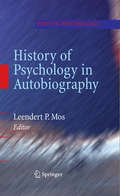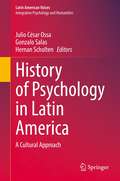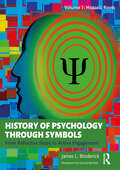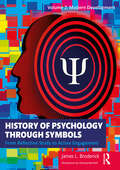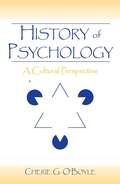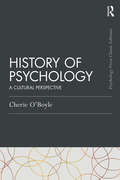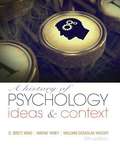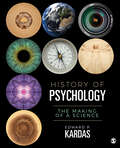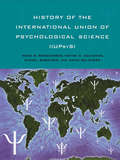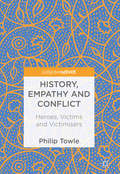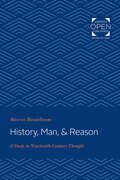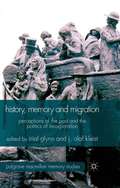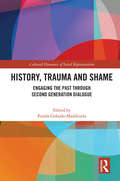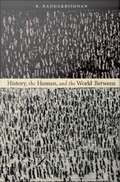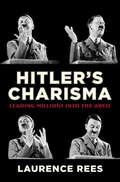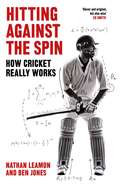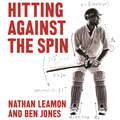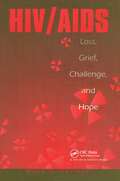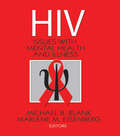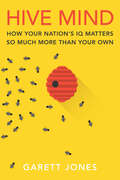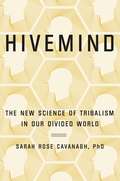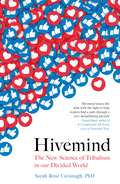- Table View
- List View
History of Psychology in Autobiography
by Leendert P. MosSince the 17th century, autobiography has an honorable place in the study of history. In 1930, the preeminent historian of psychology, Edwin Boring, writes that a science separated from its history lacks direction and promises a future of uncertain importance. To understand what psychology is and what it is becoming, the autobiographies of famous psychologists is history at it best. Here we find model inquirers of the science who offer a personalized account of themselves and their vocation in the context of the history of the science. What is characteristic of many of those who have contributed to an alternate vision of psychological science is that they never considered themselves, or were considered by others, as belonging to the mainstream of the discipline. In considering an alternative history of psychology in autobiography, the editor invited contributors whose research and writings have pushed the discipline in other directions, pushed its limits, and whose scholarship finds its philosophical framework outside the discipline altogether. If these contributors may not be model inquirers, their scholarship is very much a matter of consequence for those who wish to understand psychology. Among the outliers included here are those who devoted themselves to the writing of psychology, examining its history, theories, research and professional practices, and who enthusiastically embraced, over the course of their lives, the discipline as a human science. Their influence has been subtle as has been their appeal to many students who affection for the discipline finds its promise in a discerning self-awareness and a critical understanding of others and their worlds. This volume is not simply a collection of personal chronologies which might inspire or lend appreciation to a younger generation. Our contributors write from their personal and professional experience, of course, but they write of their thinking and understanding of the psyche as an aspect of human life, of psychology as an academic form of human sciences' inquiry, and so bring to bear their scientific and philosophical imagination to their personal challenges in their chosen vocation as psychologists. Our contributors cover a broad swath of the second half of the 20th century, the century of psychology. Nurturing the discipline from within various philosophical, social-political, and cultural roots, their autobiographies exemplify marginality, if not alienation, from the mainstream, even as their professional and personal lives give expression to engaged scholarship, commitment to vocation and, straightforwardly and reflectively, a love of the heart. From Germany, Carl Graumann, from France, Erika Apfelbaum, from Canada, David Bakan and Kurt Danziger, and from the United States, Amedeo Giorgi, Robert Rieber, and Joseph Rychlak, relate their lives to the larger contexts of our times. Their personal stories are an integral part of the historiography of our discipline. Indeed, a contribution to historiography of our discipline is constituted in their autobiographical self-presentations, for their writings attest as much to their lives as model inquirers as they do to the possibility of psychology as a human science.
History of Psychology in Latin America: A Cultural Approach (Latin American Voices)
by Julio César Ossa Gonzalo Salas Hernan ScholtenThis book presents a cultural history of psychology that analyzes the diverse contexts in which psychological knowledge and practices have developed in Latin America. The book aims to contribute to the growing effort to develop a theoretical knowledge that complements the biographical perspective centered on the great figures, with a polycentric history that emphasizes the different cultural, social, economic and political phenomena that accompanied the emergence of psychology. The different chapters of this volume show the production of historians of psychology in Latin America who are part of the Ibero-American Network of Researchers in History of Psychology (RIPeHP, in the Portuguese acronym for "Rede Iberoamericana de Pesquisadores em História da Psicologia"). They present a significant sample of the research carried out in a field that has experienced a strong development in the region in the last decades. The volume is divided into two parts. The first presents comparative chapters that address cross-cutting issues in the different countries of the region. The second part analyzes particular aspects of the development of psychology in seven countries: Argentina, Brazil, Chile, Colombia, Mexico, Paraguay and Peru. Throughout these chapters the reader will find how psychology made its way through dictatorial governments, phenomena of violence and internal armed conflict, among others. Dimensions that include rigorous analysis ranging from ancestral practices to current geopolitical knowledge of the Latin American region. History of Psychology in Latin America - A Cultural Approach is an invaluable resource for historians of psychology, anywhere in the world, interested in a polycentric and critical approach. Since its content is part of the "cultural turn in psychology" it is also of interest to readers interested in the social and human sciences in general. Finally, the thoroughly international perspective provided through its chapters make the book a key resource for both undergraduate and graduate teaching and education on the past and current state of psychology.
History of Psychology through Symbols: From Reflective Study to Active Engagement. Volume 1: Historic Roots
by James BroderickVolume One of The History of Psychology through Symbols provides a groundbreaking approach by expanding the roots of psychology beyond the Greeks to concurrent events during the same period (800 BCE–200 BCE), defined as the Axial Age by German-Swiss psychiatrist Karl Jaspers. The Axial Age emphasized seeking the universal connection that unites all humanity, a focus not on what one believed, but how one lived. This includes the human desire to connect to something greater, the totality of being human, explained by using symbols, the universal language. This volume describes the psychological implications of the Axial Age through the developments of Buddhism, Hinduism, Confucianism, Daoism, Judaism, and Zoroastrianism, as well as Greek thought. Rooted in the Axial Age, Volume One explores how the Christian and Islamic eras influenced psychology, which resulted in the Renaissance and the Scientific Revolution, which provided the historic roots of modern psychology. Rejecting the idea that science transcends historical events, this volume provides a political, socioeconomic, and cultural context for all the historic developments. The chapter on the history of mental illness provides inspiration for a new mental health system with specific recommendations for radical system reform. In the spirit of the Axial Age on the importance of how one lives, there is an emphasis on engagement with symbols and with specific exercises, called emancipatory opportunities, to apply the lessons of psychological history to daily life. This book is ideal for those seeking a dynamic and engaging way of learning about or teaching the history of psychology and would also be of interest to students, practitioners, and scholars of science, philosophy, history and systems, religious studies, art, and mental health and drug and alcohol treatment, as well as those interested in applying the lessons of history to daily life.
History of Psychology through Symbols: From Reflective Study to Active Engagement. Volume 2: Modern Development
by James BroderickVolume Two of The History of Psychology through Symbols continues a groundbreaking approach of using symbols to deepen the understanding of psychological history as well as the importance of how one lives, an emphasis on engagement with symbols and with specific exercises, called emancipatory opportunities, to apply the lessons of psychological history to daily life. From the birth of modern psychology in the laboratory of Wilhelm Wundt, Volume Two discusses how the early theories of voluntarism, structuralism, evolution, and pragmatism influenced the modern development of psychology. The importance of making unconscious shadow forces in science conscious is explored through the impact of the eugenic movement, the controversies surrounding the development of psychological testing, and current research biases in psychology. Volume Two describes how clinical psychology emerged as a powerful profession in mental health care. The Four Forces of Psychology are explored through their natural and hermeneutic science influences. Psychoanalytic and Jungian analytical psychology comprise the first force, behaviorism the second force, humanistic-existential the third force, and transpersonal psychology the fourth force that includes a groundbreaking discussion of psychedelic history and research that could revolutionize mental health and drug and alcohol treatment. Rejecting that science transcends historical events, this volume provides a political, socioeconomic, and cultural context for modern psychology and all Four Forces of Psychology. This book is ideal for those seeking a dynamic and engaging way of learning about or teaching the history of psychology and would also be of interest to students, practitioners, and scholars of science, philosophy, history and systems, religious studies, art, and mental health and drug and alcohol treatment, as well as those interested in applying the lessons of history to daily life.
History of Psychology: A Cultural Perspective
by Cherie G. O'BoyleHistory of Psychology: A Cultural Perspective easily distinguishes itself from other texts in a number of ways. First, it examines the field within the rich intellectual and cultural context of everyday life, cross-cultural influences, and contributions from literature, art, and other disciplines. Second, it is a history of ideas, concepts, and questions, instead of dates, events, or great minds. Third, the book explores the history of applied, developmental, clinical, and cognitive psychology as well as experimental psychology. Conveyed in a lively writing style, this text tells a gripping story that continues to the present day. Its current perspective allows students to connect the history of the field to the work being published in current journals. O’Boyle writes in the “historical present”, giving readers a sense of immediacy and aliveness as they journey through history. Her account uses imaginative new features, including “The Times”, which gives readers a feel for what everyday life was like during the age discussed in the chapter. Descriptions of ordinary life, as well as information about important issues influencing their lives such as wars, social movements, famines, and plagues, pique students' interest. "Stop and Think" questions, scattered throughout, enhance retention and encourage critical thinking. An ideal text for a history of psychology or history and systems of psychology course, this creative new book will also appeal to those with a general interest in the field.The Instructor’s Resource CD, written by the text author, includes class activities and demonstrations, suggestions for small group and class discussions, a list of films and videos related to the material in each chapter, and a test bank with objective and essay questions.
History of Psychology: A Cultural Perspective (Psychology Press & Routledge Classic Editions)
by Cherie O'BoyleThis classic edition includes a new foreword by former APA President Antonio E. Puente which primes the reader for a unique, bold and lively account of the history of psychology that remains relevant and useful to this day. This text surveys core areas in the history of psychology, covering the history of applied, developmental, clinical, cognitive and experimental psychology. O’Boyle writes in the "historical present," which gives readers a sense of immediacy and aliveness as they journey through history. Her account uses imaginative new features, including "The Times," which gives readers a feel for what everyday life was like during the age discussed in the chapter. Descriptions of ordinary life, as well as information about important issues influencing people’s lives such as wars, social movements, famines, and plagues will pique student interest. "Stop and Think" questions, scattered throughout, enhance retention and encourage critical thinking. This book continues to provide a creative, distinct, and valuable contribution to the field, and is an essential read for undergraduate students undertaking courses in the history of psychology and history of science, history and systems of psychology, and introductory psychology.
History of Psychology: Ideas and Context
by Wayne Viney D. Brett King William Douglas WoodyA History of Psychology: Ideas & Context, 5/e, traces psychological thought from antiquity through early 21st century advances, giving students a thorough look into psychology's origins and development. This title provides in-depth coverage of intellectual trends, major systems of thought, and key developments in basic and applied psychology.
History of Psychology: The Making of a Science
by Edward P. KardasHistory of Psychology: The Making of a Science provides students with a comprehensive overview of the formulation of the field of psychological science. Starting with a chapter on 21st Century Psychology and then jumping to the dawn of civilization, author Edward P. Kardas is able to make connections between early understandings of human behavior with our current understandings and interpretations of psychological research. Through highlighting the zeitgeist of the era and making connections to the related fields of philosophy, computational science, biology, and social science, students will have a deeper understanding of how and why the field has formed in its current landscape and a sense for where it’s headed next.
History of Psychology: The Making of a Science
by Edward P. KardasHistory of Psychology: The Making of a Science provides students with a comprehensive overview of the formulation of the field of psychological science. Starting with a chapter on 21st Century Psychology and then jumping to the dawn of civilization, author Edward P. Kardas is able to make connections between early understandings of human behavior with our current understandings and interpretations of psychological research. Through highlighting the zeitgeist of the era and making connections to the related fields of philosophy, computational science, biology, and social science, students will have a deeper understanding of how and why the field has formed in its current landscape and a sense for where it’s headed next.
History of the International Union of Psychological Science (IUPsyS)
by Mark R. Rosenzweig Wayne H. Holtzman Michel Sabourin David BélangerThis book describes the present status and the history of the International Union of Psychological Science (IUPsyS) -- the most representative international psychological body. The IUPsyS includes national psychological associations from 66 countries, with more joining every year, and it has formal relations with the United Nations, UNESCO, the World Health Organization, the International Council for Science, and the International Social Science Council. Many well known psychologists have played important roles in this international organization, and the text and many photographs bring the story to life.IUPsyS was organized formally at the 14th international Congress of Psychology at Stockholm in 1951, so the 27th International Congress of Psychology at Stockholm in 2000 marks a half-century of its existence. But the history of the IUPsyS goes back to the first International Congresses of Psychology, 1889, and to the International Congress Committee which foreshadowed the organization of the International Union.After describing the present status of the IUPsyS in Chapter 1, the book traces briefly the early development of scientific societies and organizations. Chapter 3 tells how the first International Congress of Psychology was organized in Paris in 1889 and what it accomplished. Successive international congresses and the growth of psychology during the next sixty years are treated in chapters 4-6. The founding and development of the International Union in the last half of the 20th Century are described in the remaining chapters.International Congresses organized by the IUPsyS have taken place regularly since 1951, and the IUPsyS has steadily gained in the scope and influence of its activities. The congresses, long restricted to western Europe and North America, became more representative geographically, moving to Moscow, Tokyo, Leipzig, Acapulco, and Sydney, with the 28th congress planned for Beijing in 2004. The history shows how the IUPsyS has become increasingly able to face the problems and opportunities of the 21st century.
History, Empathy and Conflict: Heroes, Victims And Victimisers
by Philip TowleThis book argues that popular culture has been transformed in a silent revolution from emphasising history’s heroes to its victims. While city squares and stations were named in the nineteenth century after military victories, now the equivalent airports are named after the victims of violence. Where war reports used to focus on the leadership of the generals and the bravery of the troops, now they are mostly about casualties, refugees and destruction. History, Empathy and Conflict examines the diplomatic consequences of such a revolution in sensibility. Many governments have responded by apologising for their country’s historic actions. History teaching in schools has sometimes been revised to reflect the new emphasis and to build confidence between nations and respect for domestic minorities. Not least of the reasons for these changes is the difficulty or impossibility of making restitution for past wrongs. But history can also be used by the media and governments to justify intervention to protect victims of civil wars only to come to be seen as victimisers themselves. The past is always difficult to interpret but is the basis of all our decisions and all institutions try to twist it to their own convenience. Sympathy with history’s victims is a great moral advance but it can be used by dissatisfied nations to justify their revisionist policies and with the election of President Trump in 2016, all the Great Powers claim to be history’s victims.
History, Man, and Reason: A Study in Nineteenth-Century Thought
by Maurice MandelbaumOriginally published in 1971. The purpose of this book is to draw attention to important aspects of thought in the nineteenth century. While its central concerns lie within the philosophic tradition, materials drawn from the social sciences and elsewhere provide important illustrations of the intellectual movements that the author attempts to trace. This book aims at examining philosophic modes of thought as well as sifting presuppositions held in common by a diverse group of thinkers whose antecedents and whose intentions often had little in common. After a preliminary tracing of the main strands of continuity within philosophy itself, the author concentrates on how, out of diverse and disparate sources, certain common beliefs and attitudes regarding history, man, and reason came to pervade a great deal of nineteenth-century thought. Geographically, this book focuses on English, French, and German thought. Mandelbaum believes that views regarding history and man and reason pose problems for philosophy, and he offers critical discussions of some of those problems at the conclusions of parts 2, 3, and 4.
History, Memory and Migration
by Irial Glynn J. Olaf KleistAs the growing diversity of societies is recognised as both an asset and a challenge, academia has been forced to re-evaluate some of its basic assumptions about migrant incorporation and social memories. However, scholars have rarely combined Migration Studies and Memory Studies to consider how perceptions of the past affect the incorporation of immigrants in their host societies. The authors in this volume merge the extensive knowledge and relevant findings produced in both fields. They demonstrate, through a series of empirical studies from Europe, North America, Australia, Asia and the Middle East, how various actors have referenced diverse conceptions of their local, regional and national pasts to include and exclude immigrants from receiving societies. By focusing on how the presentation of a certain past relates to the immigration present, the book aims to examine the relationship between the politics of memory and the incorporation of immigrants.
History, Memory and Politics in Central and Eastern Europe
by Georges Mink Laure NeumayerFourteen specialists of Central and Eastern European politics explore memory policies and politics by examining how and why contested memories are constantly reactivated in the former Soviet bloc. The book explores how new social and political actors can challenge the traditional narratives about the past produced by state bodies.
History, Trauma and Shame: Engaging the Past through Second Generation Dialogue (Cultural Dynamics of Social Representation)
by Pumla Gobodo-MadikizelaHistory, Trauma and Shame provides an in-depth examination of the sustained dialogue about the past between children of Holocaust survivors and descendants of families whose parents were either directly or indirectly involved in Nazi crimes. Taking an autobiographical narrative perspective, the chapters in the book explore the intersection of history, trauma and shame, and how change and transformation unfolds over time. The analyses of the encounters described in the book provides a close examination of the process of dialogue among members of The Study Group on Intergenerational Consequences of the Holocaust (PAKH), exploring how Holocaust trauma lives in the ‘everyday’ lives of descendants of survivors. It goes to the heart of the issues at the forefront of contemporary transnational debates about building relationships of trust and reconciliation in societies with a history of genocide and mass political violence. This book will be great interest for academics, researchers and postgraduate students engaged in the study of social psychology, Holocaust or genocide studies, cultural studies, reconciliation studies, historical trauma and peacebuilding. It will also appeal to clinical psychologists, psychiatrists and psychoanalysts, as well as upper-level undergraduate students interested in the above areas.
History, the Human, and the World Between
by R. RadhakrishnanHistory, the Human, and the World Between is a philosophical investigation of the human subject and its simultaneous implication in multiple and often contradictory ways of knowing. The eminent postcolonial theorist R. Radhakrishnan argues that human subjectivity is always constituted "between": between subjective and objective, temporality and historicity, being and knowing, the ethical and the political, nature and culture, the one and the many, identity and difference, experience and system. In this major study, he suggests that a reconstituted phenomenology has a crucial role to play in mediating between generic modes of knowledge production and an experiential return to life. Keenly appreciative of poststructuralist critiques of phenomenology, Radhakrishnan argues that there is still something profoundly vulnerable at stake in the practice of phenomenology. Radhakrishnan develops his rationale of the "between" through three linked essays where he locates the terms "world," "history," "human," and "subject" between phenomenology and poststructuralism, and in the process sets forth a nuanced reading of the politics of a gendered postcolonial humanism. Critically juxtaposing the works of thinkers such as Friedrich Nietzsche, Adrienne Rich, Frantz Fanon, Edward Said, Michel Foucault, Maurice Merleau-Ponty, Martin Heidegger, David Harvey, and Ranajit Guha, Radhakrishnan examines the relationship between systems of thought and their worldly situations. History, the Human, and the World Between is a powerful argument for a theoretical perspective that combines the existential urgency of phenomenology with the discursive rigor of poststructuralist practices.
Hitler's Charisma: Leading Millions into the Abyss
by Laurence ReesFuelled by hate, incapable of forming normal human relationships, unwilling to listen to dissenting voices, Adolf Hitler seemed an unlikely leader, and yet he commanded enormous support and was able to exert a powerful influence over those who encountered him. How did Hitler become such an attractive figure to millions of people? That is the question at the core of Hitler's Charisma. Acclaimed historian and documentary filmmaker Laurence Rees examines the nature of Hitler's appeal and reveals the role his supposed "charisma" played in his success. Here is a fascinating social, psychological and historical investigation into the formation of a personality whose determination and vision would at the outset convince a small group of like-minded political and social outcasts but would eventually win over an entire nation and plunge the rest of the world into a cataclysm unlike any that had ever been seen before. Hitler's Charisma is a natural culmination of twenty years of writing and research on the Third Reich and a remarkable examination of the man and the mind at the heart of it all.(With 16 pages of black-and-white illustrations)
Hitting Against the Spin: How Cricket Really Works
by Ben Jones Nathan Leamon'Fascinating and insightful . . . lifts the curtain to reveal the inner workings of international cricket. A must-read for any cricketer, coach or fan' Eoin Morgan'This path-breaking book should be compulsory reading for commentators and captains - and all cricket fans' Mervyn King'Clever and original but also wise' Ed SmithHow valuable is winning the toss? And how should captains use it to their advantage? Why does a cricket ball swing? Why don't Indians bat left-handed? What is a good length and why? Why are leg-spinners so successful in T20 cricket? Why did England win the World Cup? Why do all Test bowlers bowl at either 55 or 85mph? Why don't they pitch it up?All cricketers long to know the answer to these questions and many more. Only fifteen years ago it would have been difficult to answer them - cricket was guided only by decades-old tradition and received wisdom. Data has changed everything. Today we can track every ball to within millimetres; its release point, speed and bounce point are measured as are how much the ball swings, how much it deviates off the pitch, the exact height and line that it passes the stumps, and multiple other variables. Hitting Against the Spin is the story of that data, and what it can tell us about how cricket really works. Leading cricket thinkers Nathan Leamon and Ben Jones lift the lid on international cricket and explain its hidden workings and dynamics - the forces that shape cricket and, in turn, the cricketers who play it. They analyse the unseen hands that determine which players succeed and which fail, which tactics work and which don't, which teams win and which lose. They also explore the new world of franchise cricket as well as the rapid evolution of the T20 format. Revolutionary in its insights, Hitting Against the Spin takes you on a fascinating whistle-stop tour of modern cricket and sports analytics, bringing cricket firmly into the twenty-first century by revealing its long-kept secrets. This is the most important cricket book in decades.
Hitting Against the Spin: How Cricket Really Works
by Ben Jones Nathan Leamon'Fascinating and insightful . . . lifts the curtain to reveal the inner workings of international cricket. A must-read for any cricketer, coach or fan' Eoin Morgan'This path-breaking book should be compulsory reading for commentators and captains - and all cricket fans' Mervyn King'Clever and original but also wise' Ed SmithHow valuable is winning the toss? And how should captains use it to their advantage? Why does a cricket ball swing? Why don't Indians bat left-handed? What is a good length and why? Why are leg-spinners so successful in T20 cricket? Why did England win the World Cup? Why do all Test bowlers bowl at either 55 or 85mph? Why don't they pitch it up?All cricketers long to know the answer to these questions and many more. Only fifteen years ago it would have been difficult to answer them - cricket was guided only by decades-old tradition and received wisdom. Data has changed everything. Today we can track every ball to within millimetres; its release point, speed and bounce point are measured as are how much the ball swings, how much it deviates off the pitch, the exact height and line that it passes the stumps, and multiple other variables. Hitting Against the Spin is the story of that data, and what it can tell us about how cricket really works. Leading cricket thinkers Nathan Leamon and Ben Jones lift the lid on international cricket and explain its hidden workings and dynamics - the forces that shape cricket and, in turn, the cricketers who play it. They analyse the unseen hands that determine which players succeed and which fail, which tactics work and which don't, which teams win and which lose. They also explore the new world of franchise cricket as well as the rapid evolution of the T20 format. Revolutionary in its insights, Hitting Against the Spin takes you on a fascinating whistle-stop tour of modern cricket and sports analytics, bringing cricket firmly into the twenty-first century by revealing its long-kept secrets. This is the most important cricket book in decades.
Hitting Against the Spin: How Cricket Really Works
by Ben Jones Nathan LeamonThe Times Best Sports Books 2021 - 'the sporting nerd's book of the year''Fascinating and insightful . . . lifts the curtain to reveal the inner workings of international cricket. A must-read for any cricketer, coach or fan' Eoin Morgan'This path-breaking book should be compulsory reading for commentators and captains - and all cricket fans' Mervyn King'Clever and original but also wise' Ed SmithHow valuable is winning the toss? And how should captains use it to their advantage? Why does a cricket ball swing? Why don't Indians bat left-handed? What is a good length and why? Why are leg-spinners so successful in T20 cricket? Why did England win the World Cup? Why do all Test bowlers bowl at either 55 or 85mph? Why don't they pitch it up?All cricketers long to know the answer to these questions and many more. Only fifteen years ago it would have been difficult to answer them - cricket was guided only by decades-old tradition and received wisdom. Data has changed everything. Today we can track every ball to within millimetres; its release point, speed and bounce point are measured as are how much the ball swings, how much it deviates off the pitch, the exact height and line that it passes the stumps, and multiple other variables. Hitting Against the Spin is the story of that data, and what it can tell us about how cricket really works. Leading cricket thinkers Nathan Leamon and Ben Jones lift the lid on international cricket and explain its hidden workings and dynamics - the forces that shape cricket and, in turn, the cricketers who play it. They analyse the unseen hands that determine which players succeed and which fail, which tactics work and which don't, which teams win and which lose. They also explore the new world of franchise cricket as well as the rapid evolution of the T20 format. Revolutionary in its insights, Hitting Against the Spin takes you on a fascinating whistle-stop tour of modern cricket and sports analytics, bringing cricket firmly into the twenty-first century by revealing its long-kept secrets. This is the most important cricket book in decades.
Hiv/Aids: Loss, Grief, Challenge And Hope
by Mary O'DonnellFirst published in 1996.This guide for professionals who are working in the complex area of HIV/AIDS provides practical guidance and solutions. Each chapter describes specific needs and solutions based on the options available and personal choice.
Hiv: Issues with Mental Health and Illness
by Michael B. Blank Marlene M. EisenbergLearn why it&’s time for a new era in mental health and prevention scienceHIV: Issues with Mental Health and Illness is a comprehensive examination of the co-morbidity that exists between HIV/AIDS and mental illness. Internationally recognized experts in the field analyze the latest research on why HIV sufferers are at risk of developing mental illness and how people who suffer from mental illness risk contracting HIV through sexual behavior and substance abuse. This unique book focuses on clinical and diagnostic issues, the organization of service delivery systems, and community-based interventions.HIV: Issues with Mental Health and Illness presents vital contributions from physicians, sociologists, nurses, social workers, and psychologists working to develop a plan to reduce the number of persons affected by the epidemic, and to improve the quality of life of those already HIV infected. Aimed at promoting a new era in mental health and prevention science, the book examines vital issues including: the interplay between depression, HIV, and chronic fatigue; condom use among adolescents with psychiatric disorders; predicting HIV risk and how targeted intervention can address multiple health risks; how an increase in emotional stress can affect African-American women concerned about becoming HIV infected; STI risk reduction strategies; how client gender can affect mental health care service delivery; and the implementation of intervention programs as part of supported housing programs.HIV: Issues with Mental Health and Illness examines: bridging the gap between research and practice depression and HIV schizophrenia and HIV mental health policy and infectious diseases HIV prevention community-based participatory research community psychology mental health disparities translation research transforming public health systemsHIV: Issues with Mental Health and Illness is an invaluable resource for public health workers and policymakers, psychologists, psychiatrists, social work nurses, infectious disease physicians, and addictions disease counselors.
Hive Mind: How Your Nation's IQ Matters So Much More Than Your Own
by Garett JonesOver the last few decades, economists and psychologists have quietly documented the many ways in which a person's IQ matters. But, research suggests that a nation's IQ matters so much more. As Garett Jones argues in Hive Mind, modest differences in national IQ can explain most cross-country inequalities. Whereas IQ scores do a moderately good job of predicting individual wages, information processing power, and brain size, a country's average score is a much stronger bellwether of its overall prosperity. Drawing on an expansive array of research from psychology, economics, management, and political science, Jones argues that intelligence and cognitive skill are significantly more important on a national level than on an individual one because they have "positive spillovers. " On average, people who do better on standardized tests are more patient, more cooperative, and have better memories. As a result, these qualities--and others necessary to take on the complexity of a modern economy--become more prevalent in a society as national test scores rise. What's more, when we are surrounded by slightly more patient, informed, and cooperative neighbors we take on these qualities a bit more ourselves. In other words, the worker bees in every nation create a "hive mind" with a power all its own. Once the hive is established, each individual has only a tiny impact on his or her own life. Jones makes the case that, through better nutrition and schooling, we can raise IQ, thereby fostering higher savings rates, more productive teams, and more effective bureaucracies. After demonstrating how test scores that matter little for individuals can mean a world of difference for nations, the book leaves readers with policy-oriented conclusions and hopeful speculation: Whether we lift up the bottom through changing the nature of work, institutional improvements, or freer immigration, it is possible that this period of massive global inequality will be a short season by the standards of human history if we raise our global IQ.
Hivemind: The New Science of Tribalism in Our Divided World
by Sarah Rose CavanaghAt the crossroads between The Shallows and Presence, Hivemind is a provocative look at how communities can sync up around shared ideas, and how this hive mentality is contributing to today's polarized times. Hivemind: A collective consciousness in which we share consensus thoughts, emotions, and opinions; a phenomenon whereby a group of people function as if with a single mind. Our views of the world are shaped by the stories told by our self-selected communities. Whether seeking out groups that share our tastes, our faith, our heritage, or other interests, since the dawn of time we have taken comfort in defining ourselves through our social groups. But what happens when we only socialize with our chosen group, to the point that we lose the ability to connect to people who don't share our passions? What happens when our tribes merely confirm our world view, rather than expand it? We have always been a remarkably social species-our moods, ideas, and even our perceptions of reality synchronize without our conscious awareness. The advent of social media and smartphones has amplified these tendencies in ways that spell both promise and peril. Our hiveish natures benefit us in countless ways-combatting the mental and physical costs of loneliness, connecting us with collaborators and supporters, and exposing us to entertainment and information beyond what we can find in our literal backyards. But of course, there are also looming risks-echo chambers, political polarization, and conspiracy theories that have already begun to have deadly consequences. Leading a narrative journey from the site of the Charlottesville riots to the boardrooms of Facebook, considering such diverse topics as zombies, neuroscience, and honeybees, psychologist and emotion regulation specialist Sarah Rose Cavanagh leaves no stone unturned in her quest to understand how social technology is reshaping the way we socialize. It's not possible to turn back the clocks, and Cavanagh argues that there's no need to; instead, she presents a fully examined and thoughtful call to cut through our online tribalism, dial back our moral panic about screens and mental health, and shore up our sense of community. With compelling storytelling and shocking research, Hivemind is a must-read for anyone hoping to make sense of the dissonance around us.
Hivemind: The New Science of Tribalism in Our Divided World
by Sarah Rose CavanaghCavanagh brings you along on her journey through an exquisite collection of scholarly knowledge and empirical insight to ground both your mind and your gut. From zombies to bees, moral panics to conspiracy theories, Hivemind mixes the dark with the light to help readers find a path through a very destabilizing present' - Danah Boyd, author of It's Complicated: The Social Lives of Networked Teens'This fascinating book guides us through the nuanced landscape of why we think and behave the way we do-online and off-and offers a much-needed vision for how we can find our way back from the edge'- Scott Barry Kaufman, Psychologist at Columbia University and co-author of Wired to Create'Hivemind provides a fascinating tour of research that reveals our social nature, for good and for bad. Cavanagh is a natural teacher whose enthusiasm for psychology shines through on every page. Whether you're looking to have healthier technology habits, develop better relationships with others, or address societal challenges, this book will give you food for thought and wisdom to take action' - Kelly McGonigal, author of The Joy of Movement and The Willpower Instinct+++Hivemind: A collective consciousness in which we share consensus thoughts, emotions, and opinions; a phenomenon whereby a group of people function as if with a single mind.Our views of the world are shaped by the stories told by our self-selected communities. Whether seeking out groups that share our tastes, our faith, our heritage, or other interests, since the dawn of time we have taken comfort in defining ourselves through our social groups. But what happens when we only socialize with our chosen group, to the point that we lose the ability to connect to people who don't share our passions? What happens when our tribes merely confirm our world view, rather than expand it? Leading a narrative journey from the site of the Charlottesville riots to the boardrooms of Facebook, considering such diverse topics as zombies, neuroscience, and honeybees, psychologist and emotion regulation specialist Sarah Rose Cavanagh leaves no stone unturned in her quest to understand how social technology is reshaping the way we socialize. It's not possible to turn back the clocks, and Cavanagh argues that there's no need to; instead, she presents a fully examined and thoughtful call to cut through our online tribalism, dial back our moral panic about screens and mental health, and shore up our sense of community. With compelling storytelling and shocking research, Hivemind is a must-read for anyone hoping to make sense of the dissonance around us.
